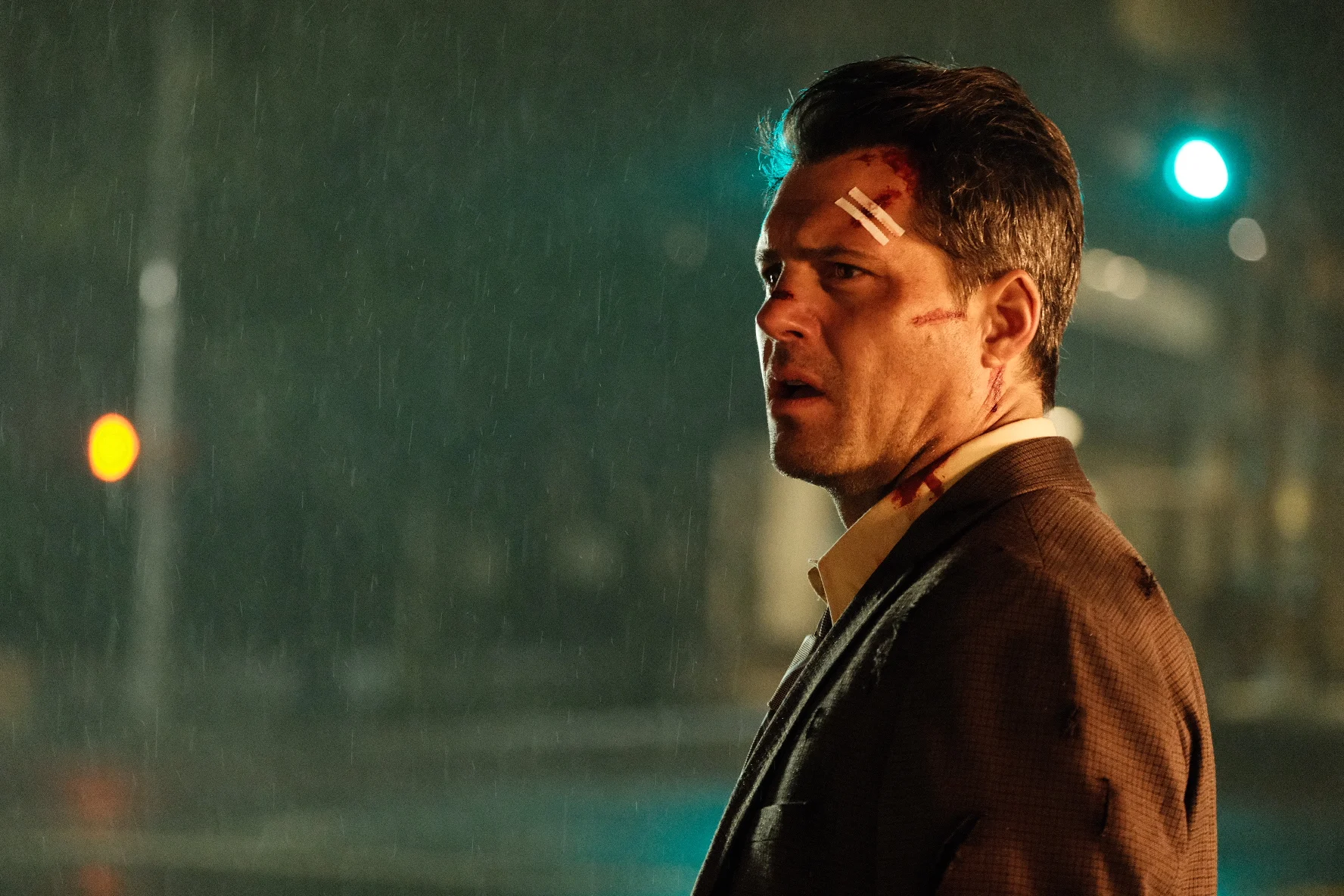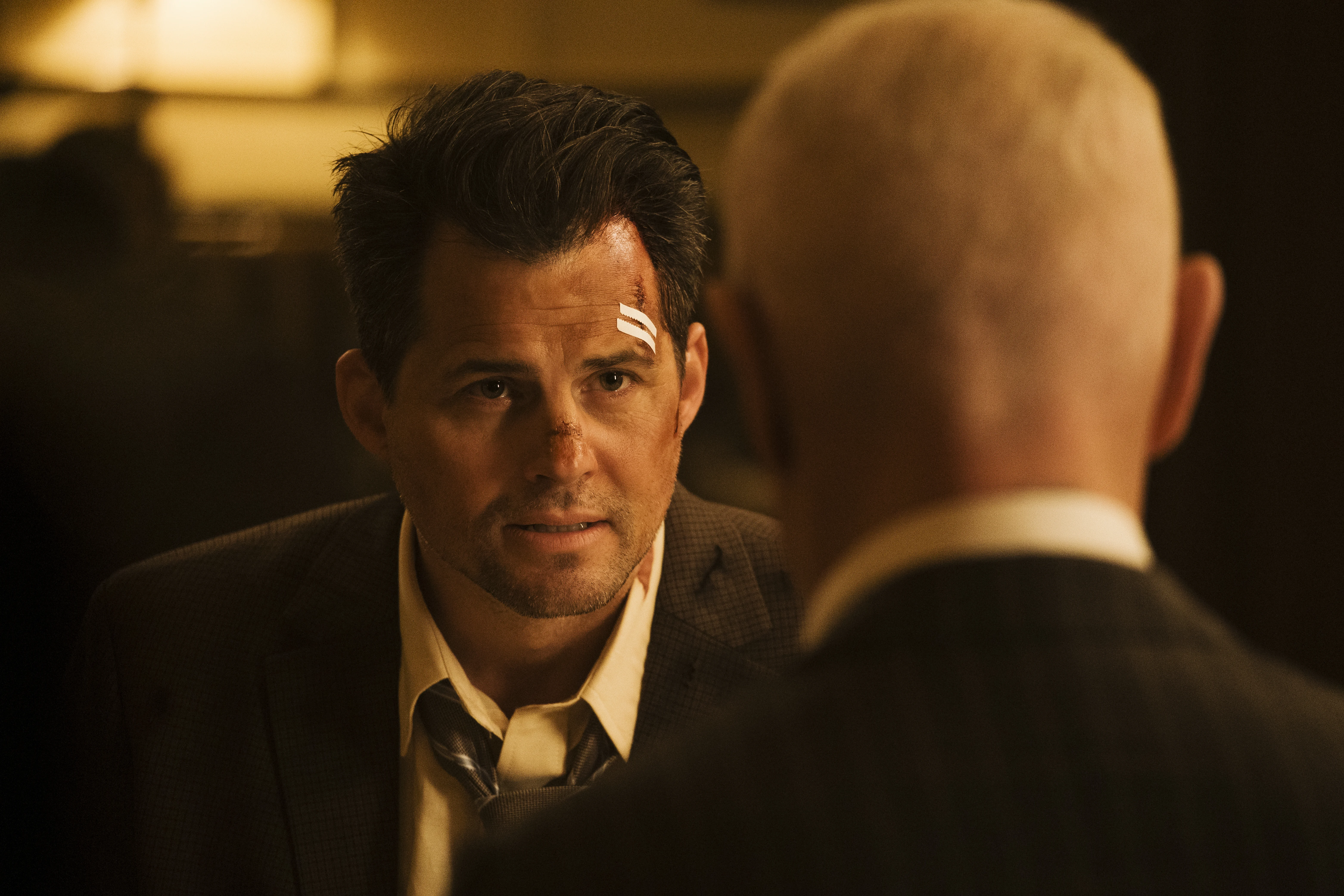How The Shift is an Allegory of Job
WARNING! This blog contains major spoilers for The Shift, showing in theaters starting December 1. For the best movie-watching experience, bookmark this blog and come back once you’ve seen the film.
The Shift is the first original film produced by Angel Studios, the home of crowd-favorites and blockbuster hits like Sound of Freedom. This riveting romantic thriller follows the story of Kevin Garner, a man displaced into an unknown dimension by a mysterious adversary known only as The Benefactor.
Though The Shift plunges audiences into an undeniably dystopian tale—infused with elements of science fiction and enriched with a moving romantic storyline—this enthralling Angel Studios original is also a stunning allegory of the story of Job in the Old Testament.
What Is The Shift About?
Kevin Garner’s career as a successful stockbroker has come crashing down in the wake of the 2008 financial crisis. Sitting at a bar over a tall drink, Kevin’s caught off-guard when a beautiful stranger introduces herself. The woman, Molly, enchants Kevin, and the rest is history. Fast-forward years later, however, and their marriage is on the rocks. Kevin is arguing with Molly on the phone when a car T-bones his, and his world is knocked out of focus.
Kevin comes to on the side of the street, being awoken by a mysterious man in a suit. The man introduces himself as “The Benefactor.” Kevin gets out his phone to call Molly back, but the man tells Kevin there’s no use; he and Kevin, the Benefactor explains, are in a different dimension altogether.
Kevin is beside himself, but his anger and confusion are met only with an eerie calm from the mysterious stranger. The Benefactor takes him to a restaurant filled with petrified citizens who watch his every move with terror. Once seated, Kevin demands proof of The Benefactor’s shifting power, challenging him to shift a terrified waitress, Tina, whom he’d called to their table. Within a moment, and to Kevin’s horror, Tina disappears into thin air. Looking around at the terrorized restaurant patrons, as well as Tina’s devastated family, Kevin realizes this bizarre threat is, in fact, very real. Scared and confused, Kevin bows his head and begins to pray aloud, asking God for deliverance. As he utters his prayer, The Benefactor mocks Kevin’s faith. As he continues, however, the Benefactor’s ridicule turns to fiery anger. The other “Kevins” weren’t religious, he remarks, and assures Kevin that God cannot—and will not—save him.
And thus, in a flash, our modern-day Job is without his family, livelihood, and friends, everything stripped away by this counterpart to the Devil. The next time we see our beleaguered protagonist, he is disguised and plugging away in a desolate world, plagued by poverty and authoritarianism and devoid of religion or hope. Kevin faithfully hides out and awaits his deliverance, working an inconspicuous job and writing down all of the scripture he can remember. Desperate for his long-lost love, he works tirelessly to try and figure out how to make it back to his world and his Molly.
Kevin does his best to live uprightly, serve others, and continue to praise God. A friend at work questions whether God is punishing him since it seems He’s turning a blind eye to Kevin’s righteous efforts. Despite encroaching doubt and discouragement, Kevin pushes on.
The city’s residents frequent the local movie theater for a curious technological experience called Vica-viewing, in which citizens view their interdimensional counterparts and marvel at their experiences. A desperate Kevin spends hours in the Vica-viewer, poring over his lives and searching for the world that contains his long-lost love.
Kevin’s faith is waning one fateful day as he flips through footage of his parallel lives until a familiar face appears on the screen: it’s Molly. His beloved Molly. Kevin’s sure it’s his long-lost wife by the necklace she’s wearing in the footage: an empty tomb, a gift for her in memory of their young son who disappeared years before.
With renewed vigor and revitalized hope, Kevin resolves to find someone with shifting capabilities who can help him get home to his own dimension. As a violent government continues to encroach upon the people’s freedom, primarily through armed enforcers called lancers, Kevin’s neighbors—Kevin’s coworker, his wife, and their young children—reach out to him. They’ve been studying whatever Christian teachings they can obtain, and ask Kevin to teach their children. He obliges, emotional and grateful to have found fellow believers in their desolate world.
Kevin’s relationship with his newfound friends is soon overshadowed by the return of The Benefactor. As the city prepares for his special recruitment event, Kevin borrows a gun and charges at the restaurant where The Benefactor is eating, only for his evil adversary to shift him immediately back to his hotel room. After an impossible fight with The Benefactor and a firefight with the lancers, Kevin’s taken aback when the Benefactor appears in his motel room.
The Benefactor urges Kevin to abandon his faith in God and join his oppressive army instead. He calls into question God’s favor for Job and His willingness to keep His promises, but Kevin is unconvinced. He races to the Vica-viewer theater but is closely followed by The Benefactor and his cronies, but manages to get to a shifter’s wristband and narrowly escape to an alternate dimension.
Kevin arrives in the halls of a dilapidated mental institution and is greeted by a dozen duplicates of his friend from work, whom he’s now discovered is a shifter working for The Benefactor. The clones chase Kevin around the hospital, and he finds refuge in a room where he makes an incredible discovery: it’s Tina, the waitress he inadvertently had shifted, that fateful day at the restaurant. In a heartbreaking display, she begs to be taken back to her own dimension and family. Kevin laments that he can’t, and their conversation is cut short by the evil shifters bursting through the doors.
Kevin shifts into another dimension and meets an alternate version of himself, a playboy living a life of selfishness and lust. Narrowly escaping said dimension with his life, Kevin finds himself in the most compelling destination of all: the middle of a shopping center, just as his beloved Molly—necklace-clad and all—is arriving with her friends.
Kevin approaches Molly, who greets him with a tentative welcome. Overcome with joy, Kevin apologizes for the way he acted. He professes his love, to Molly’s hesitancy, but is cut off when The Benefactor arrives and whisks him back to the dark Vica-viewing theater.
After ripping Kevin from his world and his love once more, The Benefactor offers Kevin a harrowing choice: either to be reunited with Molly or to return Tina—who has been shifted into the room, shivering and confused—to her dimension and family.
As Kevin wrestles with this impossible dilemma, a small miracle occurs. Realizing that good is not entirely defeated, Kevin asserts to The Benefactor that God is good and faithful, and that love and joy still thrive even in the desolate world The Benefactor had created.
To the dismay of The Benefactor, Kevin chooses Tina. The startled inter-dimensional refugee is finally reunited with her grateful family.
Kevin’s generosity and refusal to abandon his faith prove to be too much for The Benefactor.
In a sudden turn of events, he’s defeated, and Kevin finds himself in the familiar bathroom of a bar. When he walks out, he beholds a healing sight: that world’s Molly, exhaustedly sipping her drink at the bar. All that’s left to do is for Kevin to strike up a conversation with the beautiful stranger, and we know the rest: their love story is pure and lifelong, and he finally regains the love he’d lost.
Just like Job, our perseverant protagonist loses everything, only to gain it all back—emerging triumphant after a long struggle with loss, flickering faith, and even the Devil himself.
Who Was Job?
The book of Job in the Old Testament is studied and revered in secular and religious circles alike. Academics praise the book for its literary complexity, and believers cherish it for its stirring commentary on life, trials, and faith in and devotion to God.
Job is a wealthy man who resides in the biblical land of Uz. Blessed with a large family, flocks, and land, Job is described as being an incredibly righteous man, with God even praising his character to Satan; in Job 1:8, God remarks, “There is no one on earth like him; he is blameless and upright, a man who fears God and shuns evil” (NIV).
Seeing Job’s goodness, Satan claims that he only worships God because his life has been so free of trouble and filled with blessings. In a dare to God, Satan claims that if he were allowed to bombard Job with trials and tribulations, Job would abandon his devotion and curse God’s name. God agrees to this experiment, granting Satan permission to afflict Job with everything short of death.
One fateful day, Job receives four reports that reveal devastating news: his servants, sheep and all ten of his children are dead. Natural disasters and pillaging thieves claimed their lives. Overcome with grief, Job shaves his head and tears his clothing. Though his misery is overwhelming, he continues to pray and praise God, saying “Naked I came from my mother’s womb, and naked I will depart. The Lord gave and the Lord has taken away; may the name of the Lord be praised” (Job 1:20 NIV).
Permitted yet again to test Job, Satan afflicts him with boils, or sores, from head to toe. Job’s wife urges Job to give up on his faith, but Job chooses to live and fight through his afflictions.
Amid his anguish, three of Job’s friends come to visit, grieve with and comfort him. After sitting with him silently for a week, they offer their insights into Job’s situation. They tell Job that the comfort he’d given others in the past wasn’t genuine, because he didn’t know their pain, and that his punishment must be due to some sin he’d committed, so he needed to live more righteously. Particularly painfully, Job’s friends suggest that his children brought upon themselves their fates and that Job deserves greater pain than he’d already endured.
Furious, Job denounces the three men’s claims. He laments that he doesn’t understand God’s purposes, and why He judges his children for actions he could forgive or alter. He questions what it takes to please God, as humanity can’t fully understand His ways or convince Him of their plight. Because he feels he doesn’t understand his own self well enough to plead for God’s compassion, he longs either for a mediator to intervene between God and himself, or to die.
Amid this pain and confusion about the nature of God, Job affirms that he believes that his God will make his case. “Even now my witness is in heaven,” he testifies. “[M]y advocate is on high” (Job 16:19 NIV). Even so, Job is overcome with his grief and he starts to despair.
Job sorrows that God would allow afflictions to befall the good, and allow some evil individuals to live easy and prosperous lives. He laments that he wants to confront God, but can’t find Him. However, knowing he can’t obtain the wisdom of God as a mortal, Job resolves to continue to worship God, live uprightly, and thus obtain the wisdom God offers.
After Job learns from his plight to continue serving God and trusting in His ways, God intervenes and reaches out to him. He consoles Job and teaches him about his creation, and Job declares his faith in Him. God expresses his displeasure with Job’s friends for the things they told him but forgives them after Job intercedes on their behalf.
In the end, God removes Job’s health struggles, blesses Him with double the property he’d had before, gives him new children, and blesses him to live a long and happy life after the struggle he’d endured. Job is a shining example of maintaining one’s faith through trial and tribulation.

Kevin Garner and Job: How Their Stories Align
The Shift is a modern-day take on the biblical story of Job. While there are some differences between Job’s account and the thrilling 2023 film, there is also a wealth of similarities.
The movie differs from the book of Job, perhaps most obviously, because it takes place in a vastly different setting. In addition to the movie’s dystopian trappings, Kevin also lives in the setting of a separate world from his own, which is unlike that of Job. Kevin also has no direct conversation with God in the movie, which conversation Job participated in biblically.
Despite the few differences between The Shift and Job’s story, the two contain a striking number of similarities.
Both Kevin and Job started out with everything they could ever want: a wife, a family, a thriving livelihood, etc. Each has everything he loves taken from him, one by one, by the Devil (personified in the film by The Benefactor). Both men are prompted by others to curse God but ultimately refuse to abandon their faithful worship and trust in God’s timing and will. Both are ridiculed and told that God is punishing them, both by friends and by the Devil. Still, both men continue to praise God and are finally rewarded with new blessings, healing their wounds and rekindling their joy beyond what they originally had.
What We Learn From Job and The Shift
From the pages of the book of Job to Kevin’s struggle with the Benefactor’s onslaughts, there is a cornucopia of rich lessons one can learn, to help ease the suffering endured by all during the course of this life.
Both Job and Kevin exhibited patience, faith, and trust in God in the midst of their harrowing journeys. They maintained personal relationships with God, even when external sources attempted to undermine their faith in His goodness and promise. They both resisted the pressure from their peers to give up and relinquish their beliefs. Viewers of The Shift can prepare to have their faith strengthened, as well as their resolve to stand against evil in difficult periods of life.
Watch The Shift
Get your tickets, while supplies last, to watch The Shift on the big screen! You can also support the film, and show your faith in style, with the Empty Tomb collection. Offering a timeless and elegant necklace, bracelet, and tie pin, this collection will empower the whole family to remember their faith and maintain hope in heaven.
Pay it Forward today, and provide free tickets to those who otherwise wouldn’t be able to see the movie! You make it possible for us to amplify light through uplifting and powerful entertainment.

Join the Guild to Unlock Masterful Storytelling.
Help Transform the Industry.
Your membership directly contributes to the production of films like The Shift, allowing filmmakers to tell more stories that uplift, entertain, and amplify light.




